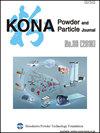多相流模拟的无网格粒子方法研究进展
IF 3.2
4区 材料科学
Q3 ENGINEERING, CHEMICAL
引用次数: 27
摘要
离散元法(DEM)和运动粒子半隐式法(MPS)是非连续介质和连续介质中最常用的无网格粒子方法。本文介绍了利用这些无网格粒子方法对多相流进行建模的最新方法。在此基础上,提出了一种基于符号距离函数(SDF)和浸入边界法(IBM)的组合模型,用于DEM模拟中任意形状的壁面边界。实际上,这个模型使用一个简单的操作来创建墙的边界。虽然SDF对于DEM的壁面边界是一个标量场,但是通过与IBM的结合,它对于CFD的壁面边界是有用的。进行验证测试以证明SDF/IBM墙边界模型的充分性。对于连续介质的无网格粒子法,相变问题是具有挑战性的课题之一,因为在相变模拟中通常采用极高粘性的流体来模拟固体状态。通过隐式算法和热流密度模型,可以有效地进行相变模拟。数值算例验证了这些模型的充分性。本文章由计算机程序翻译,如有差异,请以英文原文为准。
Recent Progress on Mesh-free Particle Methods for Simulations of Multi-phase Flows: A Review
The discrete element method (DEM) and the moving particle semi-implicit (MPS) method are the most popular mesh-free particle methods in the discontinuum and continuum. This paper describes a state-of-the-art modeling on multi-phase flows using these mesh-free particle methods. Herein, a combinational model of the signed distance function (SDF) and immersed boundary method (IBM) is introduced for an arbitrary-shaped wall boundary in the DEM simulation. Practically, this model uses a simple operation to create the wall boundary. Although the SDF is a scalar field for the wall boundary of the DEM, it is useful for the wall boundary of the CFD through combination with the IBM. Validation tests are carried out to demonstrate the adequacy of the SDF/IBM wall boundary model. Regarding the mesh-free particle method for continuum, the phase change problem is one of the challenging topics, as the solid state is usually modeled by extremely high viscous fluid in the phase change simulation. The phase change simulation is shown to be efficiently performed through an implicit algorithm and a heat flux model in the MPS method. The adequacy of these models is verified by the numerical examples.
求助全文
通过发布文献求助,成功后即可免费获取论文全文。
去求助
来源期刊

KONA Powder and Particle Journal
工程技术-材料科学:综合
CiteScore
8.40
自引率
4.90%
发文量
35
审稿时长
>12 weeks
期刊介绍:
KONA publishes papers in the broad field of powder science and technology, ranging from fundamental principles to practical applications. Papers describing technological experience and critical reviews of existing knowledge in special areas are also welcome.
 求助内容:
求助内容: 应助结果提醒方式:
应助结果提醒方式:


